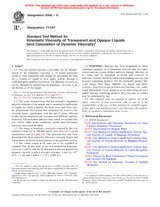Wir benötigen Ihre Einwilligung zur Verwendung der einzelnen Daten, damit Sie unter anderem Informationen zu Ihren Interessen einsehen können. Klicken Sie auf "OK", um Ihre Zustimmung zu erteilen.
ASTM D445-11
Standard Test Method for Kinematic Viscosity of Transparent and Opaque Liquids (and Calculation of Dynamic Viscosity)
Automatische name übersetzung:
Standard Test Method for kinematische Viskosität von transparenten und opaken Flüssigkeiten ( und Berechnung der dynamischen Viskosität )
NORM herausgegeben am 1.1.2011
Informationen über die Norm:
Bezeichnung normen: ASTM D445-11
Anmerkung: UNGÜLTIG
Ausgabedatum normen: 1.1.2011
SKU: NS-27273
Zahl der Seiten: 12
Gewicht ca.: 36 g (0.08 Pfund)
Land: Amerikanische technische Norm
Kategorie: Technische Normen ASTM
Die Annotation des Normtextes ASTM D445-11 :
Keywords:
dynamic viscosity, kinematic viscosity, viscometer, viscosity, Calibration--petroleum analysis instrumentation, Dynamic viscosity, Electrical insulating petroleum products, Kinematic viscosity, Viscosity--petroleum products, ICS Number Code 17.060 (Measurement of volume, mass, density, viscosity), 75.080 (Petroleum products in general)
Ergänzende Informationen
| Significance and Use | ||||||||||||||||||||||||||||||||||||||||||||||||||||||||||||||||
|
Many petroleum products, and some non-petroleum materials, are used as lubricants, and the correct operation of the equipment depends upon the appropriate viscosity of the liquid being used. In addition, the viscosity of many petroleum fuels is important for the estimation of optimum storage, handling, and operational conditions. Thus, the accurate determination of viscosity is essential to many product specifications. |
||||||||||||||||||||||||||||||||||||||||||||||||||||||||||||||||
| 1. Scope | ||||||||||||||||||||||||||||||||||||||||||||||||||||||||||||||||
|
1.1 This test method specifies a procedure for the determination of the kinematic viscosity, ν, of liquid petroleum products, both transparent and opaque, by measuring the time for a volume of liquid to flow under gravity through a calibrated glass capillary viscometer. The dynamic viscosity, η, can be obtained by multiplying the kinematic viscosity, ν, by the density, ρ, of the liquid. Note 1—For the measurement of the kinematic viscosity and viscosity of bitumens, see also Test Methods D2170 and D2171. Note 2—ISO 3104 corresponds to Test Method D445. 1.2 The result obtained from this test method is dependent upon the behavior of the sample and is intended for application to liquids for which primarily the shear stress and shear rates are proportional (Newtonian flow behavior). If, however, the viscosity varies significantly with the rate of shear, different results may be obtained from viscometers of different capillary diameters. The procedure and precision values for residual fuel oils, which under some conditions exhibit non-Newtonian behavior, have been included. 1.3 The range of kinematic viscosities covered by this test method is from 0.2 to 300 000 mm2/s (see Table A1.1) at all temperatures (see 6.3 and 6.4). The precision has only been determined for those materials, kinematic viscosity ranges and temperatures as shown in the footnotes to the precision section. 1.4 The values stated in SI units are to be regarded as standard. The SI unit used in this test method for kinematic viscosity is mm2/s, and the SI unit used in this test method for dynamic viscosity is mPa·s. For user reference, 1 mm2/s = 10-6 m2/s = 1 cSt and 1 mPa·s = 1 cP = 0.001 Pa·s. 1.5 WARNINGMercury has been designated by many regulatory agencies as a hazardous material that can cause central nervous system, kidney and liver damage. Mercury, or its vapor, may be hazardous to health and corrosive to materials. Caution should be taken when handling mercury and mercury containing products. See the applicable product Material Safety Data Sheet (MSDS) for details and EPA’s websitehttp://www.epa.gov/mercury/faq.htmfor additional information. Users should be aware that selling mercury and/or mercury containing products into your state or country may be prohibited by law. 1.6 This standard does not purport to address all of the safety concerns, if any, associated with its use. It is the responsibility of the user of this standard to establish appropriate safety and health practices and determine the applicability of regulatory limitations prior to use. |
||||||||||||||||||||||||||||||||||||||||||||||||||||||||||||||||
| 2. Referenced Documents | ||||||||||||||||||||||||||||||||||||||||||||||||||||||||||||||||
|
Empfehlungen:
Aktualisierung der technischen Normen
Wollen Sie sich sicher sein, dass Sie nur die gültigen technischen Normen verwenden?
Wir bieten Ihnen eine Lösung, die Ihnen eine Monatsübersicht über die Aktualität der von Ihnen angewandten Normen sicher stellt.
Brauchen Sie mehr Informationen? Sehen Sie sich diese Seite an.




 Cookies
Cookies
